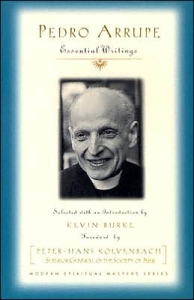
|
Posted January 25, 2005
Book: Pedro Arrupe: Essential Writings Selected with an Introduction by Kevin Burke Orbis Books, Maryknoll, NY, pp.215 An Excerpt from the foreword:
The one who has the bride is the bridegroom; the best man, who stands and listens for him, rejoices greatly at the bridgegroom’s voice. So this joy of mine has been made complete. He must increase; I must decrease. Pedro Arrupe is a spiritual master in the line of John the Baptist. Like John, he speaks prophetically from a life of ascetical simplicity and compassion. He confronts the great ethical and religious questions of the day, challenging not only his brother Jesuits and other men and women in vowed religious life, but all Christians and all people, to be rooted in truth and guided by love. He calls for authentic spiritual renewal, integrating prayer with the life of service. But above all, Father Arrupe is profoundly and passionately committed to Jesus Christ. An Excerpt from the book: Poverty is a Gospel mystery, and one must love Christ to comprehend it. In the replies to my inquiry, one is struck by statements such as this: “There are those who simply do not know Christ’s spirit of poverty, which is what makes one truly poor. Their living of poverty is not theological; it is not centered on Christ; and so it is merely an external, a material poverty.” Such an attitude is obviously unacceptable and needs to be corrected with the help of prayer and an effort to acquire the proper spirit of the Exercises and the Constitutions. The mystery of poverty springs from the mystery of the kenosis of Christ, Christ’s emptying of himself. It is a mystery, something that human reason cannot fully comprehend, something we can approach only in the measure that we are enlightened by the Holy Spirit. The problematic of religious poverty is neither sociological nor financial. It is not even merely theological. It is a problematic of faith: of love for Christ poor, poor in the human life he chose for himself, poor in the life of his mystical body. And so, to arrive at a measure of understanding of what poverty means, a double experience is necessary. A faith experience, first of all, of Christ’s emptying of himself; but also a lived experience of being really poor. If either of these two experiences is lacking, one cannot really know what religious poverty is. If the mystical experience of Christ’s kenosis is lacking, one might possibly know human poverty and misery – that poverty and misery which we are called upon to fight in themselves and in their effects — but one cannot know what religious poverty is and means. If the personal lived experience of real poverty is lacking, one might possibly arrive at some knowledge of the poverty of the historical Christ and its characteristic traits, but one cannot know the actual poverty of the poor . . . Faith impels us to the imitation of Christ poor, and this in turn impels us to actual poverty: such is the upward spiral generated by the interaction of faith experience and lived experience which is the basic pattern in this order of being. Interaction: for the lived experience of poverty impels us to the love of Christ, a love which purifies and liberates. As St. Ignatius puts it, “It is no small grace that Divine Goodness gives us when it gives us the opportunity of actually tasting what we should always desire if we are to be conformed to our model Jesus Christ . . . . . . Let us spell this out, using the same terminology that Ignatius does. What does poverty do? It disposes the human instrument to union with God and endows him or her with apostolic mobility. Union with God, effected by the theological virtues, is nourished by evangelical poverty, which is both founded in faith and increases faith, since Christ known by faith is the key to an understanding of what poverty really means, and poverty, in turn, is the supremely credible witness of what faith is: “faith without works is dead.” Poverty means total detachment, at least in attitude; it means withdrawing trust from all things created and placing all our trust and all our hope in God, in the faith-certainty that our help can only come from him. It is to this total trust in the providence of God that poverty leads us by dispossessing us of everything and thus liberating us from attachment to anything. “The surest as well as the most needed contribution we can give to the reform of the universal church,” says St. Ignatius, “is to go about it as lightly burdened with things as possible, as our Lord himself has shown us.” The experience of human insecurity leads us to find shelter in the unfailing security f God . . . Table of Contents: A Mysticism of Open Eyes 1. His own life Surviving the Atomic Bomb Recognizing the “hand of the Lord” at the Eucharist Fifty Years as a Jesuit True Biography Prayer for New Eyes 2. The Life of Christian Discipleship Companions of Jesus Evangelical Poverty Dimensions of Christian Discipleship The Sacred Heart of Jesus Prayer to Christ our Model 3. Ignatius of Loyola The Mystical Experiences of Ignatius of Loyola The Spiritual Exercises of Ignatius The Ignatian Mysticism of Love An Invocation to the Trinity 4. The World Word of Sin and Grace The Worldwide Refugee Crisis Men and Women for Others Facing the World Twenty-five Years after Hiroshima Veni, Creator Spiritus Epilogue From Silence, Final Words |
|
